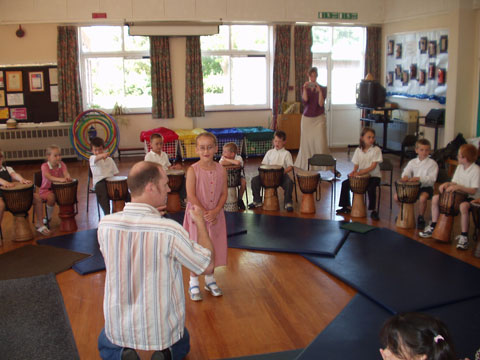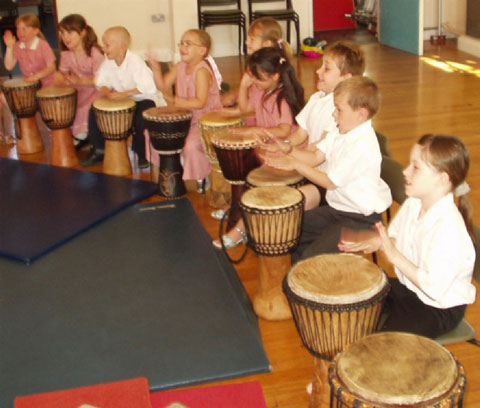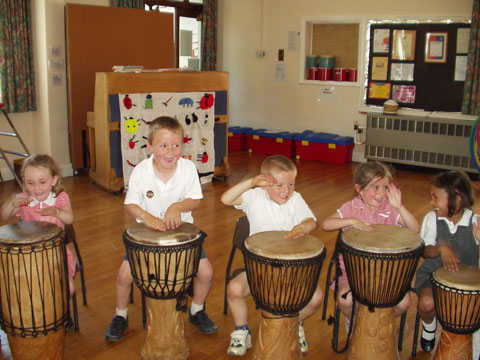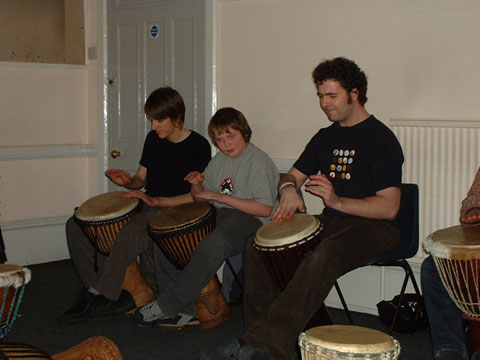|
|
|
|
Workshops for Schools
"a very enjoyable and memory making afternoon" Bethany School, Sheffield
|
|
Our main objectives for schools workshops are to provide an outlet for children to express themselves through hand drumming and percussion, and at the same time build self-confidence whilst working in a team environment. We work with West African djembes and doun douns (bass drums), Latin American congas and bongos, and small items of hand percussion (bells, shakers, wood blocks, tambourines etc). We provide all the equipment for the sessions and can cater for class sizes of up to 40.
"..very well pitched to the age and ability of pupils. Responded and interacted well with children...A very enjoyable day for everyone involved."
John Murday, Herbert Strutt PS, Belper |

|
|

|
Paul has been running workshops in schools since 2000, starting with a lottery funded organisation called 'Yorkshire Youth and Music', whose targets were to encourage disaffected children back into mainstream education through music. He regularly works with special needs classes, adapting the workshop style to suit the fluctuating abilities and needs of these pupils.
"We would like to comment that the whole school, staff and pupils alike, thoroughly enjoyed the experience. Not only was everyone able to participate, but your program was tailored to suit every age group. Parents have commented on the fact that their children had a fantastic time..."
Carol Mason, Head teacher, Cheswick Green PS, Solihull.
• CRB Authorised • All drums and percussive intruments provided • Can cater for large classes • Public liability insurance • Over 5 years teaching experience • |
Primary Schools
All sessions start off with an introduction/brief history of the drums, as there are about 4 different types of drums I use.
The reception class is mainly a fun based affair with noise association games i.e. if we play our drums quietly it sounds like rain and loud sounds like thunder. I also give the children a chance to start and stop the group by using a 'magic stick'. It's more a case of giving the reception class an experience with the drums as opposed to creating rhythms.
I start to dispense with the noise association games for the Y1/ Y2's and move on to more rhythm based games where, like the reception class, some children will have the opportunity to lead (start/stop) the rest of the group but in a slightly different way. The sessions end with everyone playing a simplistic rhythm with an opportunity for the more enthusiastic members of the group to 'solo/showcase'. This is dependant on class dynamics and timetable.
The Y3/ Y4 are roughly the same but I start to bring in cross rhythms to raise the bar slightly, splitting the group in 2, with 1 side of the circle playing an opposing rhythm to the other.
The Y5/ Y6 sessions are geared towards creating a traditional West African styled rhythm complete with traditional 'calls and responses', without dispensing with the starting rhythm games as I feel this part of the workshop goes along way to breaking down any inhibitions or initial shyness some children may have. The end product of the Y5/Y6 sessions is a rhythm up to performance standard which could be performed to the rest of the school/selected parents/school governors in an end of school assembly timetable permitting. My standard timetable includes all classes (rec-Y6) giving the younger children half hour segments building up to 1 hour sessions for the older ones but some schools like to concentrate on specific year groups giving them a focused session geared towards a performance at the end of the day
In any given workshop I may suddenly ask the children if they have their 'singing voices' on. This is to introduce West African chants, but this is dependant on time and is not guaranteed, although on average I introduce a chant for at least 2 of the classes during the day.
I have a drum for everyone in the groups (average class sizes apply) including teachers who are encouraged to join in and help hold down the more complex rhythms if they can.
|
|

|
Secondary Schools
The workshops start with the educational introduction to the drums. Fun-based 'ice-breaking' rhythm games follow, including instructions on how to get the best sounds from the drums/techniques before moving on to a facilitation stage where the pupils have ample opportunity to express themselves, and finally teaching traditional West African rhythms which encourage an air of trust, as one section of the group must rely on the counter section, who perform a cross rhythm. Within the rhythm I stop the group for a silent count of 4 or 8, where, timetable permitting, I ask the pupils (individually or in groups) to create something to fill the space. I also encourage spontaneous rhythms, which arise from the children's enthusiasm and creativity. This often leads to the creation of their own African styled rhythm, all of which could culminate in a mini school performance if desired/timetable permitting.
Contact Paul for more information about rates, advice on timetables for the day and availability. |
What are the aims of Drummers United school workshops?
In supporting and encouraging children’s creativity, I must first develop an atmosphere of relaxed enjoyment, enabling the pupils to express themselves without fear of embarrassments and breaking down inhibitions. It is important to praise creative expression and encourage participation, and although there obviously are certain boundaries during tuition these have to be achieved carefully so that the creativity does not suffer.
One of the priorities I have when working with children is to ensure all members of the class are included; Obviously some of the more extrovert children will take to the lesson immediately and it is a priority for me to enable the more introverted pupils to have as much fun as the others. Fun is also a priority, children respond well to a cheery, light-hearted approach in tuition, especially in music lessons. I must also ensure that the pupils are made aware of each others participation especially when introducing cross rhythms which involves a great deal of teamwork, and finally artistic expression, which allows the pupils a chance to release tensions whilst actually creating a piece of work.
One of the ways in which I encourage the children’s creativity is to allow them some form of responsibility, for instance, passing the role of solo drummer within the circle to various pupils and letting them lead/facilitate their class for a short period of time. I also find that teaching children the basics then offering them a goal and allowing them space to develop their own styles is also a successful strategy.
|
Headteacher Cluster Meetings
Try something new and different for your cluster meetings. Experience exactly the same fun and excitement as your pupils in my workshops. Ideal as a ‘Let your hair down’ session, or a fun way to help develop team building skills (click here for short video clip of teacher training session)
|
|
|
|
|

